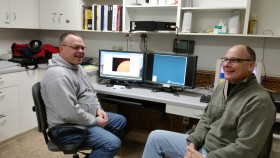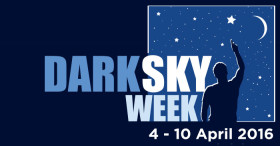 This is International Dark Sky Week 2016 and “weather” or not the skies are clear, the Door Peninsula Astronomical Society will open the Leif Everson Observatory on Saturday night at 8:00.Somewhere in the world, the skies will be clear and DPAS is now able to stream images from other telescopes. Utah Street is open, so it will be easy to get to the Astronomy Campus.
This is International Dark Sky Week 2016 and “weather” or not the skies are clear, the Door Peninsula Astronomical Society will open the Leif Everson Observatory on Saturday night at 8:00.Somewhere in the world, the skies will be clear and DPAS is now able to stream images from other telescopes. Utah Street is open, so it will be easy to get to the Astronomy Campus.As Crossroads plans its parking lot expansion, we want to avoid creating light pollution .
For the safety of our program participants, we must install parking lot lights, but we are determined that these lights meet Dark Sky Initiatives. The obviously reason for shielding our light is that that the parking lot expansion is north east of the Leif Everson Observatory. Excess light would obscure the circumpolar constellations and asterisms (Ursa Major a.k.a The Big Dipper, Cassiopeia, and Cepheus) which, because they are visible throughout the year, are the star grouping we like to show visitors at DPAS Viewing Nights. (The next Viewing Night at our Astronomy Campus is this Saturday, April 9 starting around 8:00.)
Because we are an environmental preserve, we also care about wildlife. According to a publication produced by the International Dark-Sky Association, “Animals and plant live by a rhythm which is attuned to our planet’s 24-hour cycle. This is an inherited trait, which is passed through the genes of a species. Humans may notice a change in their circadian rhythms when they travel by airplane between several time zones, characterize by sleepiness, lethargy and a general sense that something is “off.”
“Wildlife and fish experience this same disorientation when there is too much artificial light at night. Behavior governing mating, migration, sleep, and finding food is determined by length of nighttime. Light pollution disrupts these age-old patterns.”
Peepers and other tree frogs have moist, thin skins, They prefer cool, damp places where they can avoid drying out. During breeding season, they tend to become active after sundown when the air is humid and cool.
According to research done by the Dark Sky Association, “light pollution causes amphibians to become confused and disoriented, causing a decrease in reproduction resulting in lower population, reduced foraging for food, and confusion of the natural instincts that protect against predators and the elements.
“Many species of birds migrate or hunt at night. This dependence on darkness makes them extremely vulnerable to bright light in areas that are naturally dark. The nighttime environment is a crucial natural resource for all life on Earth, but the glow of uncontrolled outdoor lighting has hidden the stars, radically changing the nighttime environment. We are only just beginning to understand the negative repercussions of losing this natural resource.”
A major goal of the Crossroads Parking Lot Project is to keep our night skies dark.
While a dark sky is desirable at night, in the middle of a hot muggy day, a dark sky can be ominous, perhaps indicating an extreme weather event. That’s when we need Storm Spotters.
On Wednesday, April 6 at 6:00 PM, Crossroads will host “Severe Weather Spotting Training and Outreach.” a free program sponsored by the National Weather Service Green Bay, Door County Emergency Management, Door County Amateur Radio Emergency Services and the Door County Amateur Radio Club. The guest speaker is Scott Berschback from the NWS Office in Green Bay.
Storm spotters are volunteers who help their communities and the NOAA National Weather Service by “keeping an eye on the sky” during severe weather. Trained spotters contact NWS via phone, amateur radio or internet, keeping forecast staff updated with the latest weather information from their location. Anyone over the age of 15 can become a spotter, to be an active spotter, one must attending this training.
On Tuesday, April 12, at 7:00, Master Gardeners will offer a program called “Garden Rooms & Structures” Presenter Tom Luebker will discuss the history of garden rooms and describe rooms that he and his wife, Jane, have created on their property over the past ten years. He will suggest plants that do well in Door County. He also will discuss structures, focusing on the importance of unity, repetition, and maintainability in buildings, structures and garden art.
Crossroads at Big Creek welcomes learners of all ages to programs in science, history and the environment. The Collins Learning Center is open daily 2:00-4:30. During construction, you can reach the Crossroads Main Entrance from the Highway Detour by taking County T, crossing the highway and driving to Big Creek Road. Turn right and drive to Lily Bay Road. Turn right again. Lily Bay merges with Michigan Street at Crossroads. To reach the Astronomy Center, follow Utah Street (which will cross the highway during construction, or follow Memorial Drive under the bridge, turn on to 18th Place, and then turn right an go up the hill to the Cove Road Intersection.
Wednesday, April 6
6:00 \ “Severe Weather Spotting Training and Outreach.”
This free program sponsored by NWS Green Bay, Door County Emergency Management, Door County Amateur Radio Emergency Services and the Door County Amateur Radio Club. The guest speaker is Scott Berschback from the National Weather Office in Green Bay.
Storm spotters are volunteers who help their communities and NOAA” National Weather Service by “keeping an eye on the sky” during severe weather. Trained spotters contact NWS via phone, amateur radio or internet, keeping forecast staff updated with the latest weather information from their location. Anyone over the age of 15 can become a spotter, to be an active spotter, one must attending this training. Lecture Hall of the Collins Learning Center.
Saturday, April 9
8:00 Viewing Night at the Leif Everson Observatory
Join members of the Door Peninsula Astronomical Society in exploring the night sky. If weather is good, we will view the beautiful Door County sky from the StarGarden, but if skies are cloudy, we now have the technology to screem images from other telescopes. Free and open to the public. The Astronomy Campus is located at 2200 Utah Street
Tuesday, April 12
7:00 Master Gardener Lecture: Garden Rooms and Structures Presenter Tom Luebker will discuss the history of Garden Rooms and describe rooms that he and his wife, Jane, have created on their property over the past ten years. He will identify plants that do well in Door County. He also will discuss structures focusing on the importance of unity, repetition, and maintainability in buildings, structures and garden art. Free and open to the public.


